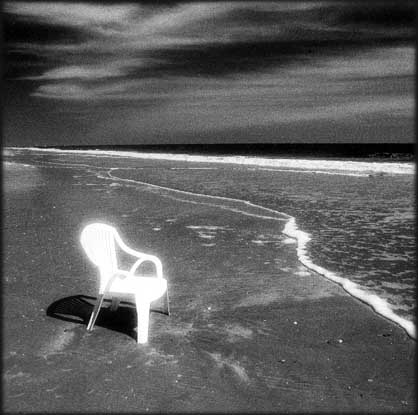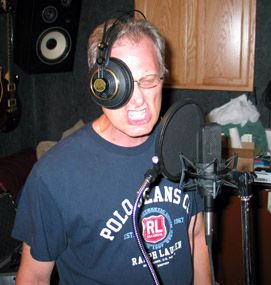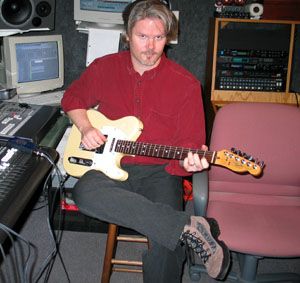Interview

(Progressive Newsletter Nr.47 01/04)
excerpts from an interview with Michael Dearing (Guitar, Keyboards, Vocals), Carl Groves (Guitar, Keyboards, Vocals), Kevin Thomas (Drums)
Michael Dearing: We’ve kept it open to everyone’s interpretation. The story is reasonably obscured, granted, but we kept asking ourselves, “Do we enjoy 'The lamb lies down on Broadway' any less because the story is indecipherable?” And the answer was always, “No.” Some people have figured it out, while some of the other interpretations have left me wondering whether the reviewer was listening to the same album we made! But most of them have had their own twist on what they think we’ve said, which was kind of the point.
Carl Groves: What Mike said. We’ve left it open. It’s funny to me, because in many ways, I see this album as having more of a concrete storyline than 'Catatonia'. As to giving away the story…I think we’ll keep it open. Art is open for everyone. It should be different for every listener.
Kevin Thomas: I’m enjoying the different interpretations I have heard or read. At this point, I would probably choose to leave it open. However, there is an ad for the CD that gives some clues as to our intended meaning.
Even though you choose to create a concept album, the songs are not connected, flowing directly into another. Do you see the danger of a fragmentation of the whole concept or can the songs also stand for themselves?
MD: Hopefully the songs can stand for themselves as well as serving the whole. We’ve done that before with both 'Catatonia' and 'The robbery of murder', and most of the classic concept albums tend to go that way, i.e. 'The lamb lies down on Broadway', 'Clutching at straws', 'Tommy' etc.
CG: I see all of our conceptual pieces as singular works-not a collection of songs. To me, this does indeed make several of the songs awkward when played alone. However, my comrades - as well as our fans - don’t seem to be bothered when we do it.
KT: I don’t know. Being too close to the project, I hear them as parts of a whole. A couple of them could be pulled out of context without a problem, if someone wanted to “air-time them” but, to me, it is to be taken as a whole, like a symphonic composition; each song is an important expression of the mind of the protagonist.
How hard or difficult was it to arrange and compose this time, until everyone in the band was happy with the final result?
MD: This one might have been the easiest one yet. Carl came up with the basic concept and a story/lyric outline and said, “Go”. We then got together and played our ideas and then worked on fleshing the whole thing out.
KT: I don’t remember much of anything being a problem with regard to arrangements. Actually, once we have a foundation and general roadmap for each song, they just seem to develop on their own. It’s always been that way for us. We do spend extra time to tweak things before we are happy, but those are mostly technical issues, in my mind.
CG: Again, I’ll go with Mike and Kev on this one. It was the easiest to do musically. That’s strange because it was also the most “band-oriented” album we’ve done. But “Be” seemed to be a story that everyone in the band could relate to on some level. Therefore, everyone in the band was on board from the beginning and we were all tossing ideas to each other. There were some minor disagreements about some things - aren’t there always? - but nothing major. No fist fights.

On your website there’s a lot of information about the “Be” sessions and additionally some really fine, sometimes freaky pictures. How important is the fun or humor aspect in your music and in the band?
MD: Very. So often prog is seen as a deathly serious music played by and for deathly serious people - to paraphrase Robert Fripp, “Earnest, bearded, bespectacled young men”. We tend to lean in the same direction as Rush, which is to take what we do very seriously, but not take ourselves seriously at all.
CG: We had a lot of fun recording “Be”. I think because our music is so intense, it’s necessary to lighten up when the “tape isn’t rolling.” If we don’t have fun, what’s the point? In fact, in the 12+ years we’ve been together, lack of fun has been the only legitimate threat to Salem Hill’s existence.
KT: Oh… I would say it ranks right up there with coffee, beer and an occasional good cigar. Our music can be quite an investment on the listener, and the themes have been “somewhat dark” over the years. A good balance of humor is necessary to keep us from walking into the ocean…or something like that.
Were there thoughts about including violin parts by David Ragsdale again or was this never an option, being more a problem of extreme distance for that he’s now playing in Las Vegas?
MD: No - none of the songs called for violin this time around. With recording technology being what it is now he doesn’t have to be here to do our stuff anyway. If we need violin in the future he’d undoubtedly be the first call, though.
CG: With the nature of the “Be” story, the near demise of the band, and our newly rediscovered passion for being Salem Hill, we were fairly adamant about keeping this album “in the family”, i.e., no guest stars.
KT: That was never an option.
Additionally to the regular album, those who ordered early enough, received a CD-r of unreleased Salem Hill recordings. Can you tell a little bit more about it and what’s included on it?
MD: That has my favorite SH piece on it, a version of “Around the universe in 80 days” that we recorded a few years ago for a Klaatu tribute album. Since most of our fan base never heard it - and the rest of the album was lame enough that we really couldn’t encourage them to go buy it - we included it as a freebie. There are also a couple of demos from around 1990 or so which feature the three piece version of the band - Carl, Pat & Kevin. The rest of it is made up of various bloopers & funny moments that occurred during the making of the album.
CG: About a month into recording “Be”, we also starting recording various takes that were pretty funny. So that part of the CD-r is made up of bloopers. Again, it’s another example of how we’re a fairly goofy bunch of guys, despite whatever dark or disturbing subject matter we’re laying down.
KT: You just have to hear it.


After "Not everybody's gold" the band unofficially called it quits.What happened that lead to the decision to stop the band and what was the reason to start a-new back in 2002?
MD: Making "Not everybody's gold" was a nightmare. As we’ve documented probably too many times now, we had all kinds of personal tension, musical tension, deadline tension, tension tension, and more than a few tension headaches! 'Tension Headache' would probably have been a better album title now that I think of it. So after it was all said and done, Carl decided that he’d had enough. Nobody’s making any money to speak of in this band, so if it’s not fun anymore, why bother doing it? We decided that we were going to do a farewell show as a way of saying “thank you” to our fans who’ve stuck with us all these years and record it as a souvenir for us and for them. When the four of us started rehearsing - Michael Ayers declined to participate - all the difficulties stayed away and we sounded great and had an enormous amount of fun. In fact a large chunk of that show ended up on Puppet Show. We had planned on putting out a totally live album, but then Cyclops insisted on the aforementioned “bonus track”. We picked the song and then went over and recorded it and again, no difficulties, much fun, etc. At that point it became apparent that continuing would probably be a good idea…
CG: Again, Mike nailed it. It’s all about fun. We spent too long rehearsing "Not everybody's gold", too long recording it, waited too long for the replication to get completed, and ultimately spent too much money getting it done. And, in retrospect, it all may have been worth it had we been proud of what we’d done. But I wasn’t thrilled with much of the material, including my own contributions, I was not particular impressed by many of the performances, and was completely furious at how poorly it was mastered. Combine all of the above with the fact that we were playing several live shows around Nashville that were absolutely pointless, and that was it for me. I’d had enough. It was only when we started enjoying being in the same room with each other during the recording of “Waiting for wonderfulness” in the Spring of 2002 that I regained an enthusiasm and optimism for a future Salem Hill.
KT: There were several reasons. On my part, there were personal / family issues, and an pending job offer in Florida. "Not everybody's gold" was a bleak time for us, for which Carl assumed 90% of the grief in getting it finished. We were unhappy with the line-up and the music business, in general. I think a long hiatus, and some reflection was what prompted us to do one more. Aside from the art aspect, we really would like to make some money one of these days. The amount of time and energy required to take a project from start to finish is staggering. And as much as we love creating, we have felt the dream of stardom “slipping away” with our youth. There is hope, however, that we can create enough of a fan-base and eventually generate some capital; and, dare I say, be able to make Salem Hill our job.
After recording 7 albums so far, is there something like a work routine, a strict schedule for an album or do you also try out new things?
MD: There’s no such thing as a schedule with us!
CG: Right! Getting together is always an undertaking for us. As far as recording, we do have a routine. Usually, we get together with demos and hash out the skeleton of a song or, in the case of “Be”, an entire album. Then I’ll load templates of all the songs into a computer. Then Kevin will come in and lay down drums. Pat comes in next. Mike and I build on that, and then we do the vocals. I’d say that Mike and Pat are probably the most adventurous when it comes to trying new things. We do some of that, but normally we all have a good idea of what we’re going to do before we even get to the studio.
KT: It’s very complicated. We have to work around four different schedules, and it’s not easy. That’s why recording one person at a time is the only way we can get anything done. See my previous response…to be able to consider this band our full-time job would make us a scary force to be reckoned with.
Did the internet help you more regarding for example promotion and reaching a wider audience or did it harm more damage, by for example downloading music?
MD: It’s probably helped, since without the advent of the internet most of the people who listen to us would never have been aware that we even exist.
CG: Since it’s impossible to know what and to what extent if any of Salem Hill's music is being pirated, I have nothing but positive things to say about the Internet and what it’s meant to us. Quite honestly, without the Internet, there would be no Salem Hill.
KT: I only see it as a help. The internet is what has kept us alive.
Kristian Selm © Progressive Newsletter 2004